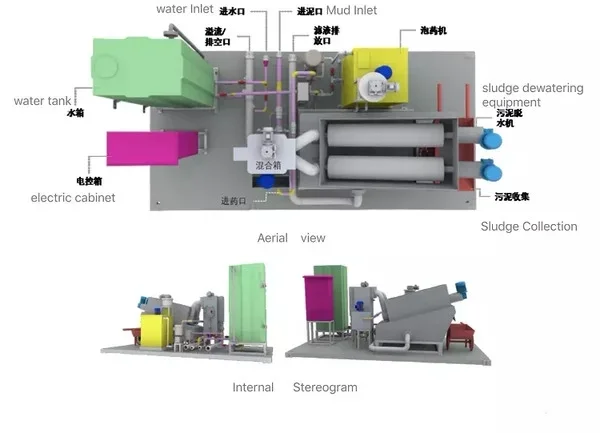The future development trend of sludge dewatering machine: intelligence and automation

With the increasing awareness of environmental protection and the increasing demand for sewage treatment, sludge dewatering machine, as important equipment in the sewage treatment process, is also constantly developing and innovating. In the future, development trends will mainly focus on intelligence and automation. This article will discuss the future development trend of intelligence and automation of sludge dewatering machines, and analyze the advantages and challenges it brings.
1. Intelligent development trends
Intelligence is an important direction for the future development of sludge dewatering machines. With the continuous advancement of artificial intelligence and Internet of Things technology, the sludge dewatering machine will have a higher level of intelligence. First, intelligence will enable automated operation and monitoring. Through sensors and data acquisition technology, parameters such as moisture content, temperature, and concentration of sludge can be monitored in real-time, and intelligent control can be performed based on real-time data to improve dehydration efficiency and quality. Secondly, the intelligent sludge dewatering machine will be able to perform fault self-diagnosis and predictive maintenance. By analyzing historical data and machine learning algorithms, equipment failures can be predicted in advance and maintenance measures can be taken in a timely manner to reduce downtime and repair costs. In addition, remote monitoring and control can also be achieved to improve operation and maintenance efficiency and management levels.
2. Automation development trends
Automation is another important direction for the future development of sludge dewatering machines. Through automation technology, a higher degree of automated operation and control can be achieved. First, the automated sludge dewatering machine will be able to achieve fully automated operation. Through the automated control system, operations such as automatic start and stop, automatic adjustment, and automatic cleaning can be realized, reducing manual intervention and improving production efficiency and stability. Secondly, the automated sludge dewatering machine will be able to automate the sludge treatment process. Through automated control systems and advanced treatment processes, processes such as automatic transportation, automatic dosing and automatic discharge of sludge can be realized, reducing manual operations, improving treatment efficiency, and reducing environmental pollution.
In addition to intelligence and automation, the future development of sludge dewatering machines will also involve other aspects of innovation and improvement. For example, the energy-saving design and environmental performance of the sludge dewatering machine will be further improved to reduce energy consumption and impact on the environment. At the same time, the material and structural design of the sludge dewatering machine will also be continuously innovated to improve the durability and processing effect of the equipment. In addition, the sludge dewatering machine will also be combined with other environmental protection equipment and technologies to form a more complete and efficient sludge treatment system to achieve resource recycling and environmentally sustainable development.

3. Advantages and challenges brought by intelligence and automation
The development of intelligence and automation will bring many advantages to the sludge dewatering machine. First of all, intelligence and automation can improve dehydration efficiency and quality, reduce energy consumption and chemical usage, and reduce operating costs. Secondly, intelligence and automation can improve the stability and reliability of the sludge dewatering machine, reduce equipment failures and downtime, and improve production efficiency and operation and maintenance efficiency. In addition, intelligence and automation can also improve safety and environmental protection, and reduce manual operations and environmental pollution.
However, the development of intelligence and automation also faces some challenges. First of all, the application of intelligent and automation technology requires a large amount of data support and algorithm optimization, which puts forward higher requirements for data collection and processing capabilities. Secondly, the application of intelligent and automation technology requires professional technical talents and managers, which puts forward higher requirements for talent training and management levels. In addition, the application of intelligent and automation technology also needs to fully consider the safety and reliability of the equipment to avoid accidents and losses caused by technical failures or human errors.
To sum up, the future development trend of sludge dewatering machines will mainly focus on intelligence and automation. The development of intelligence and automation brings many advantages, improving dehydration efficiency and quality, reducing operating costs, and improving production efficiency and environmental protection. However, the development of intelligence and automation also faces some challenges, which need to be overcome in terms of technology, talent, and safety. Therefore, sludge dewatering machine manufacturers and users should actively promote the research, development, and application of intelligent and automated technologies to jointly promote the sustainable development of the sludge dewatering machine industry.
https://www.mingyecn.com/The-future-development-trend-of-sludge-dewatering-machine-intelligence-and-auto.html
- Art
- Causes
- Crafts
- Dance
- Drinks
- Film
- Fitness
- Food
- الألعاب
- Gardening
- Health
- الرئيسية
- Literature
- Music
- Networking
- أخرى
- Party
- Religion
- Shopping
- Sports
- Theater
- Wellness


